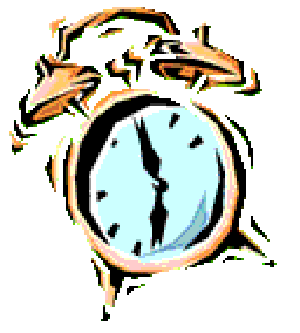Every now and then, we have to lift our eyes from the path we’ve trod, and reassess. You can’t have perspective on where you’re going if you never looked at where you’ve been. Taking a good, long, eyes-wide-open look at not just what you’ve done, but why, can be terrifically painful, but so is living an unexamined and  unfulfilled life.
unfulfilled life.
It’s a truism that life seems to speed up as we age. It does, but my grandson will tell you that he feels like his life has been flashing before his eyes since he started high school. Yep, even the millennials are feeling the time crunch. And that ain’t good.
It has a lot to do with the constant bombardment of information we receive – even when we leave our homes, we’re still shackled to our cell phones. We are always accessible, always as ‘on call’ as a brain surgeon, even if we’re just fast food wranglers at the local MickeyD’s. We can only squeeze a little solitude out of the tube by becoming signal free, literally out of range.
We feel under ‘time pressure’ when there’s too much to do or be done, and not enough time or ability to juggle it all. That’s consistent right across the civilized world, and in all age groups, but I suspect a little less wearying to those with the financial ability to spread some of the stress around.
There’s always a price to be paid for deferring – on purpose or with genuine remorse – the things we want to do, and the people we want to see, because time gets away from us. When you are young, missing a party or failing to meet up with a visiting friend has little impact. As you age, the special moments missed can quickly become sources of deep regret.
(There’s a reason why this song has more than 16 million hits, 43 years after its debut.)
This constant ‘running to keep in place’ can also conceal something far more sinister … all that ‘busyness’ often conceals truths we can’t bear to face. That job you hate, but keep reporting to every miserable day, dreaming of, but never getting more education or training that might free you, until one day you wake up and realize it’s time to retire. That face you make as you try on clothes and vow once again to exercise regularly and rein in the calories; the disgust you feel as you light up another ciggy and watch your money and health smoulder into ashes; those brilliant ideas, that plan to try a different lifestyle, or to revive or leave a stale relationship … all back-burnered with what seems to be logical reasons on the surface, but are really a mental resistance to facing what our minds know is the reality of our lives, and changing those circumstances.
 The snooze button on your alarm clock is a perfect metaphor for the putting off of what we desire. With all good intentions, you set the alarm for half an hour earlier; today you’ll start that exercise program/clean your room/start that novel you’ve been mentally outlining.
The snooze button on your alarm clock is a perfect metaphor for the putting off of what we desire. With all good intentions, you set the alarm for half an hour earlier; today you’ll start that exercise program/clean your room/start that novel you’ve been mentally outlining.
The next morning, you hear the bzz bzz bzz, but reach out a sleepy arm and hit ‘pause’ on what you’d planned to do. Just a few minutes more, you mumble, and then, when the alarm goes off again, you grumble a bit as you stop the annoying sound that’s harshing the mellow of your dreams. By the third sound of the alarm, you’re angry and resentful, and you SLAM that snooze button down; how dare this world demand so much of me? Can’t I get just a little bit of peace, a few moments more of this hypnotic dreamland in which I’ve already conquered all my demons and can just live happily ever after?
And that’s how your day starts. Rather than being filled with determination, energy and positivity, you now have a culprit on which to blame your cranky mood, and inability to actually begin to change what you dislike about your situation. Your bedhead, all the wrongs of the world, all the things left undone … all the fault of that bloody alarm clock!
And in a sense, that’s true. Because in smacking down the snooze button, you’ve surrendered your power to an inanimate object, your every bright hope defeated by an innocuous plastic square.
When we’re unsure if we have it in us to do something new or different, no matter how humble the goal, we surrender to the fear of being rejected, or mocked or humiliated. “Nothing ventured, nothing gained” turns to “better safe than sorry.”
We’ll defend our paralysis to the death, citing a myriad of reasons why we can’t possibly be expected to break out of our self-imposed prisons. Being clever is no hindrance; the smarter we are, the more convoluted and seemingly reasonable our ex cuses will be. The mere thought of change is so frightening that we freeze in place, scrambling to justify our stasis to ourselves and others. It’s a trap we set and spring, usually off our own bat, but sometimes with the collusion of others who might be affected by change – our families, our bosses, and our friends can not only impede change, but bolster our own insecurities by adding their own needs and fears to the mix.
cuses will be. The mere thought of change is so frightening that we freeze in place, scrambling to justify our stasis to ourselves and others. It’s a trap we set and spring, usually off our own bat, but sometimes with the collusion of others who might be affected by change – our families, our bosses, and our friends can not only impede change, but bolster our own insecurities by adding their own needs and fears to the mix.
Why is that a problem, you ask? If we’re doing it to ourselves, who’s the victim? Well, society for one. Each of us impacts many others in our lifetime. The frustration and inner rage felt by those who can’t achieve their goals touches us all in both violent and non-violent ways.
Eventually our inertia leads to learned helplessness …. “in psychology, a mental state in which an organism forced to bear aversive stimuli, or stimuli that are painful or otherwise unpleasant, becomes unable or unwilling to avoid subsequent encounters with those stimuli, even if they are “escapable,” presumably because it has learned that it cannot control the situation….
 This may explain why individuals may accept and remain passive in negative situations despite their clear ability to change them. In his book Helplessness (1975), Martin E.P. Seligman argued that, as a result of these negative expectations, other consequences may accompany the inability or unwillingness to act, including low self-esteem, chronic failure, sadness, and physical illness. The theory of learned helplessness also has been applied to many conditions and behaviours, including clinical depression, aging, domestic violence, poverty, discrimination, parenting, academic achievement, drug abuse, and alcoholism.” (Wikipedia)
This may explain why individuals may accept and remain passive in negative situations despite their clear ability to change them. In his book Helplessness (1975), Martin E.P. Seligman argued that, as a result of these negative expectations, other consequences may accompany the inability or unwillingness to act, including low self-esteem, chronic failure, sadness, and physical illness. The theory of learned helplessness also has been applied to many conditions and behaviours, including clinical depression, aging, domestic violence, poverty, discrimination, parenting, academic achievement, drug abuse, and alcoholism.” (Wikipedia)
 But in the end, the true enemy is time. There’s only so much of it, and none of us know when our clock will run out, or even when the gears will wear so badly that physical limitations will make decisions for us. We’re fragile creatures, we humans, both physically and mentally. We spend our time searching for happiness and fulfillment, believing it is our right, believing that life is fair, and that our own good intentions are a moral authority that will make us winners – or at least, respectable ‘also-rans.’
But in the end, the true enemy is time. There’s only so much of it, and none of us know when our clock will run out, or even when the gears will wear so badly that physical limitations will make decisions for us. We’re fragile creatures, we humans, both physically and mentally. We spend our time searching for happiness and fulfillment, believing it is our right, believing that life is fair, and that our own good intentions are a moral authority that will make us winners – or at least, respectable ‘also-rans.’
In reality – life isn’t fair, and spending all of our short time on the planet hitting the snooze button, and indulging in wishful thinking without actually working towards our betterment is a terrible waste. Better to have tried and failed, scraped knees and bruised feelings be damned, than to get to the end of our brief lives unscathed, unchallenged, and unchanged from the raw material we were handed at birth.
